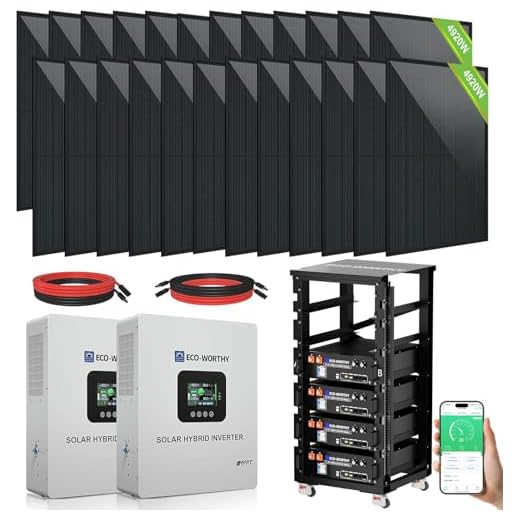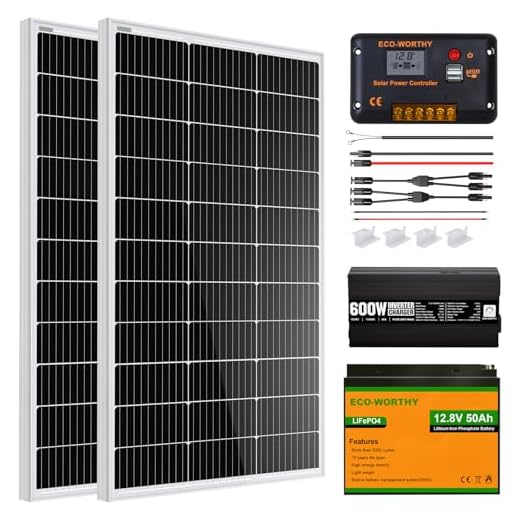



A refrigerator is an essential appliance that most households rely on to keep food and drinks fresh and safe to consume. However, it can be a significant source of energy consumption, especially in areas where electricity prices are high or in off-grid locations.
Solar power is a clean and renewable energy source that can help reduce electricity bills and reliance on fossil fuels. To power a refrigerator using solar energy, you need to determine the appropriate number of solar panels.
The number of solar panels required depends on various factors, including the refrigerator’s energy consumption, the location’s sunlight availability, and the size of the solar panels. It’s essential to consider these factors to ensure that your solar system can generate enough electricity to meet your refrigerator’s power needs.
In general, a typical household refrigerator consumes around 150-600 watts per day. To calculate the number of solar panels needed, you’ll need to determine the amount of sunlight available in your location. Solar panels have different wattage outputs, and their efficiency varies.
Calculating Solar Power for a Refrigerator
When it comes to powering a refrigerator with solar panels, it’s important to consider the energy consumption of the appliance and the available sunlight in your location. By calculating these factors, you can determine the number of solar panels required to power your refrigerator efficiently.
Step 1: Energy Consumption
The first step is to determine the energy consumption of your refrigerator. This information can typically be found on a label or in the manual that came with the appliance. Look for the power rating in watts.
Step 2: Daily Energy Requirement
Next, you need to calculate the daily energy requirement for your refrigerator. Multiply the power rating by the number of hours the refrigerator is running each day. For example, if your refrigerator has a power rating of 100 watts and runs for 8 hours a day, the daily energy requirement would be 800 watt-hours.
Step 3: Solar Panel Output
The output of solar panels is measured in watts, so you need to convert the daily energy requirement from watt-hours to watts. Divide the daily energy requirement by the average number of peak sunlight hours in your location. For instance, if your location has an average of 5 peak sunlight hours, dividing 800 watt-hours by 5 will give you an output of 160 watts.
Step 4: Solar Panel Capacity
The capacity of solar panels to generate energy also needs to be considered. Solar panels have an efficiency rating, so multiply the solar panel output by the efficiency rating to determine the number of solar panels needed. For example, if the efficiency rating is 80%, dividing 160 watts by 0.8 will give you a total of 200 watts.
Therefore, to power a refrigerator with a daily energy requirement of 800 watt-hours, you would need approximately 200 watts of solar panels. Keep in mind that these calculations are approximate and should be adjusted based on your specific circumstances and energy consumption patterns.
| Step | Description |
|---|---|
| Step 1 | Determine the energy consumption of the refrigerator |
| Step 2 | Calculate the daily energy requirement |
| Step 3 | Convert the daily energy requirement to watts |
| Step 4 | Consider the capacity and efficiency of solar panels |
Determining the Energy Consumption
Before determining how many solar panels are required to power a refrigerator, it is important to understand the energy consumption of the refrigerator itself.
To determine the energy consumption of a refrigerator, you can refer to the Energy Guide label typically found on the appliance. This label provides important information such as annual energy usage, estimated operating costs, and energy efficiency ratings.
In general, the energy consumption of a refrigerator is measured in kilowatt-hours (kWh) per year. This figure represents the amount of energy the refrigerator will consume over the course of a year under typical operating conditions.
Once you have determined the annual energy consumption of your refrigerator, you can calculate the daily energy consumption by dividing the annual figure by 365 (the number of days in a year).
It is important to note that the energy consumption of a refrigerator can vary based on factors such as size, age, and usage patterns. Older refrigerators tend to be less energy efficient compared to newer models, so it is important to consider these factors when calculating energy consumption.
Understanding Solar Panel Specifications
When it comes to selecting solar panels for your refrigerator, it’s important to understand the various specifications that are typically associated with solar panels. These specifications give you important information about the panel’s performance and capabilities. Here are some key specifications to consider:
1. Wattage
Wattage refers to the amount of power that a solar panel can produce. It is an important specification to consider as it determines how much electricity the panel can generate. To power a refrigerator, you will need a solar panel with a sufficient wattage output to meet the refrigerator’s energy requirements.
2. Efficiency
Solar panel efficiency is an indicator of how effectively the panel can convert sunlight into electricity. A higher efficiency means that the panel can produce more power with the same amount of sunlight. When selecting solar panels for your refrigerator, consider choosing panels with a higher efficiency to maximize power generation.
There are also other specifications to consider, such as voltage, current, and temperature coefficients. These specifications provide additional insights into the panel’s performance under different conditions, such as when it’s exposed to high temperatures or low light conditions.
By understanding these solar panel specifications, you can make an informed decision when selecting solar panels to power your refrigerator. It’s important to ensure that the chosen panel has the necessary wattage and efficiency to meet your refrigerator’s energy requirements efficiently and effectively.
Calculating the Solar Panel Capacity
When determining the number of solar panels needed to power a refrigerator, it’s essential to calculate the solar panel capacity required. This will ensure that the system can adequately meet the energy demands of the refrigerator.
The first step in calculating the solar panel capacity is to determine the power consumption of the refrigerator. This information can usually be found on the appliance’s energy label or in the user manual. Look for the power consumption in watts (W), as this will be the unit of measurement used.
Next, consider the average daily hours of sunlight in your location. The number of sunlight hours will vary depending on geographical location and time of year. For example, if your location receives an average of 5 hours of sunlight per day, use this number for the calculation.
To calculate the solar panel capacity, divide the power consumption of the refrigerator by the average daily sunlight hours. For instance, if the refrigerator consumes 500 watts and there are 5 hours of sunlight, the solar panel capacity needed would be 100 watts (500 watts / 5 hours = 100 watts).
It’s important to note that this calculation only determines the solar panel capacity required to power the refrigerator under optimal conditions. Factors such as cloudy weather, shading, and energy loss in the system should also be taken into account when designing a solar power system. It’s advisable to consult a professional or use online calculators to get a more accurate estimation.
By calculating the solar panel capacity accurately, you can ensure that your refrigerator receives sufficient power from renewable sources. This will not only reduce your reliance on grid electricity but also help you save on utility bills and reduce your carbon footprint.
Considering Other Factors
While the number of solar panels needed to power a refrigerator primarily depends on its energy consumption, there are other factors to consider.
Location
The location of your home plays a crucial role in determining the efficiency of solar panels. If your location receives an abundance of sunlight throughout the year, you may require fewer panels to power your refrigerator. Conversely, if your location experiences long periods of cloud cover or limited sunlight, you may need more panels to compensate for the reduced solar energy.
Panel Efficiency
Not all solar panels are created equal. The efficiency of each panel can vary, with some panels capable of converting a higher percentage of sunlight into electricity. Higher-efficiency panels can generate more power from the same amount of sunlight, reducing the number of panels required to power a refrigerator.
Backup Power
It’s important to consider if you want your solar panel system to provide backup power for your refrigerator during cloudy days or power outages. If backup power is a requirement, additional panels or a battery storage system may be necessary to ensure a continuous power supply.
In conclusion, determining the number of solar panels needed to power a refrigerator goes beyond just its energy consumption. Considering factors such as location, panel efficiency, and the need for backup power can help you make an informed decision about the ideal number of solar panels for your specific situation.
FAQ
Can solar panels power a refrigerator?
Yes, solar panels can power a refrigerator. Solar panels convert sunlight into electricity, which can be used to power various appliances, including refrigerators.
How many solar panels do I need to power a refrigerator?
The number of solar panels required to power a refrigerator depends on various factors such as the energy consumption of the refrigerator, geographical location, and sunlight availability. On average, a typical residential refrigerator requires around 3-5 solar panels to generate enough power.









